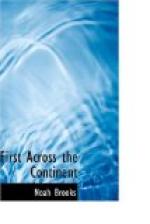Three days later, all the Indians, except the old guide, left them. They now passed up Fish Creek, and finding no track leading over the mountains they cut their way. Their journal says:—
“This we effected with much difficulty; the thickets of trees and brush through which we were obliged to cut our way required great labor; the road itself was over the steep and rocky sides of the hills, where the horses could not move without danger of slipping down, while their feet were bruised by the rocks and stumps of trees. Accustomed as these animals were to this kind of life, they suffered severely; several of them fell to some distance down the sides of the hills, some turned over with the baggage, one was crippled, and two gave out, exhausted with fatigue. After crossing the creek several times we at last made five miles, with great fatigue and labor, and camped on the left side of the creek in a small stony low ground. It was not, however, till after dark that the whole party was collected; and then, as it rained and we had killed nothing, we passed an uncomfortable night. The party had been too busily occupied with the horses to make any hunting excursion; and though, as we came along Fish Creek, we saw many beaver-dams, we saw none of the animals themselves.”
The Indian guide appears here to have lost his way; but, not dismayed, he pushed on through a trackless wilderness, sometimes travelling on the snow that now covered the mountains. On the fourth of September, the party came upon a large encampment of Indians, who received them with much ceremony. The journal says:—
“September 5, we assembled the chiefs and warriors, and informed them who we were, and the purpose for which we had visited their country. All this was, however, conveyed to them through so many different languages, that it was not comprehended without difficulty. We therefore proceeded to the more intelligible language of presents, and made four chiefs by giving a medal and a small quantity of tobacco to each. We received in turn from the principal chief a present consisting of the skins of a blaireau (badger), an otter, and two antelopes, and were treated by the women to some dried roots and berries. We then began to traffic for horses, and succeeded in exchanging seven and purchasing eleven, for which we gave a few articles of merchandise.
“This encampment consists of thirty-three tents, in which were about four hundred souls, among whom eighty were men. They are called Ootlashoots, and represent themselves as one band of a nation called Tushepaws, a numerous people of four hundred and fifty tents, residing on the head-waters of the Missouri and Columbia rivers, and some of them lower down the latter river. In person these Indians are stout, and their complexion lighter than that common among Indians. The hair of the men is worn in queues of otter skin, falling in front over the shoulders. A shirt of dressed skin covers the body to the knee,




